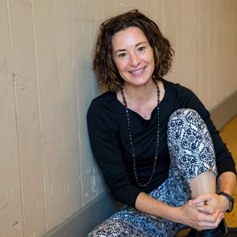 Lucrecia Blanco – owner and founder of Blanca Lighting Design – appears mellow but is a hard-working powerhouse who has solidified her place in the PNW lighting industry. In addition to running her firm for the past 10 years, Lucrecia also lectures on lighting design at the University of Washington with another local designer, CJ Brockway. The class they teach was previously taught by former Lighting Design Lab staffer, Edward Bartholomew! She’s had quite the journey; not without its challenges, but she has met them masterfully.
Lucrecia Blanco – owner and founder of Blanca Lighting Design – appears mellow but is a hard-working powerhouse who has solidified her place in the PNW lighting industry. In addition to running her firm for the past 10 years, Lucrecia also lectures on lighting design at the University of Washington with another local designer, CJ Brockway. The class they teach was previously taught by former Lighting Design Lab staffer, Edward Bartholomew! She’s had quite the journey; not without its challenges, but she has met them masterfully.
Lucrecia’s schooling began in Argentina, where she got her BA in theater arts at the Universidad del Salvador and took lighting classes at Teatro Colon while working in theater. When Lucrecia finished her degree, she took advantage of an exchange program in the US, and later got her MFA with the University of Illinois. After receiving her Master’s in lighting design, she taught for 2 years at Northern Illinois University, heading their lighting design department. Lucrecia also toured with dance companies as a lighting designer. She had her son, Mateo, during this period and fondly recalls how Mateo took his first steps on a stage. Looking to spend more time with her family, she left touring behind to focus on architectural lighting.
Lucrecia’s design philosophy is reminiscent of her time in theatre. She feels “architecture is mostly static. Light should add life!” She is passionate about making lighting appear dynamic in time – like in theatre, “with cues that flow into each other.”
While inspired by her background in theater and dance, Lucrecia is a savvy business owner. She says her competitive edge “goes beyond artistic inspiration – I’m in the business of building buildings!” Her approach is practical and efficient, impacting the overall built environment through her design work. She runs a lean operation with a small staff, flexible work schedules, and minimal overhead.
Lucrecia’s success has not come without challenges. She says “it’s been interesting seeing industry’s reaction to strong women.” She recalls working with individuals that made her feel excluded from projects; her assertiveness and the way she commands attention in a room has not always been appreciated. However, Lucrecia believes that lighting in Seattle “is run by strong women,” making it the “exception to the rule.”
And, while gender has been one challenge, “add an accent,” she says, “and then you see deeper discrimination.”
To move through these situations, Lucrecia gives her colleagues and clients the benefit of the doubt, directly addressing her accent or acknowledging that her name may be difficult for some to pronounce as a way to break the ice and get to the project at hand. (Editors’ note: While we commend Lucrecia for trying to make her colleagues and clients feel more at ease, we challenge our industry to become more inclusive and equitable to eliminate the need to explain away an accent, gender, or background.)
Despite the challenges, she believes lighting is a wonderful choice for anyone considering making this their career. Part of the allure is that lighting professionals undertake projects with larger social implications, such as “living in a city where you’ve worked on its buildings and impacted people’s lives through illumination – that is a great feeling.”
Lucrecia appreciates the human centric lighting trend the industry is currently exploring. While understanding the final product is an illuminated space, she knows “we’re lighting for people.” She implores lighting practitioners to put themselves in the tenants’ feet – “Who is going to be there? What are they going to feel like?” – and with that in mind, the final product will be all the better for it.
Again, Lucrecia is a study in balance between art and practicality when suggesting how to accelerate a lighting career: “Push your partners.” Learn about supply chain partners (reps, distributors, contractors, etc.), and look for ways to help improve their procedural efficiencies. This deepens the relationships and gives a more personal touch of “we’re all in this together.”
